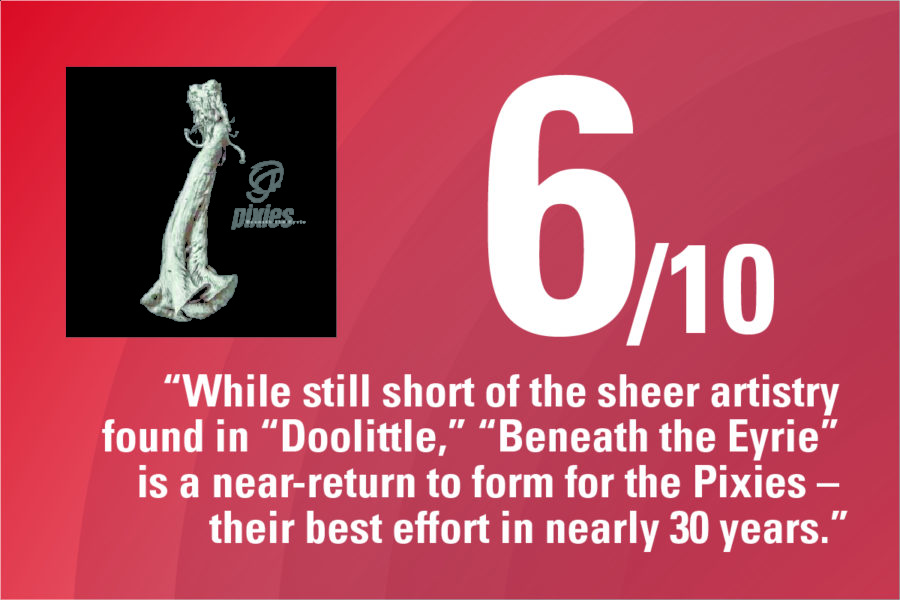Review: Pixies act their age on “Beneath the Eyrie”
pixies limelight review
September 15, 2019
Overproduced and often lacking in energy, “Beneath the Eyrie” is not a genre-breaking album, nor on par with any of the Pixies’ greatest work, but is a solid entry into their century-spanning discography.
The Pixies’ legendary status put great pressure on the release of 2014’s “Indie Cindy,” their first since “Trompe le Monde” in 1991 and Kim Deal’s departure in 2013. The final result was a mixed bag of tracks, compiled from their previous three EPs, without an ounce of the depth or staying power found in “Surfer Rosa” or “Doolittle.”
Their follow-up “Head Carrier” in 2016 similarly left much to be desired, and the band — alt-rock revolutionaries credited as inspiration to Nirvana, Radiohead and Weezer — showed their age more than ever.
Between unsatisfying studio work and unenthusiastic live performances, the Pixies’ return in the 21st century seemed more like a cynical cash grab at what brand power they had left than a triumphant return of rock legends.
While still short of the sheer artistry found in “Doolittle,” “Beneath the Eyrie” is a near-return to form for the Pixies — their best effort in nearly 30 years. This is not the Pixies of the late 1980s, however, frontman Black Francis has reigned himself in. Now he acts as a crypt keeper, taking the listener on a tour of the gothic and macabre, his vocals leading you down a shadowy path, past crumbling headstones in a long-forgotten graveyard.
“I wanted to intermingle with the spirit world, with life and death and with the mystical and a more surreal landscape,” Francis told The Independent on writing the new album.
“In the Arms of Mrs. Mark of Cain” is everything the Pixies should be and sets a heavy-hearted tone for the album. Francis’ haunting vocal performance twists the tale of Cain and Abel, accompanied by a galloping drumbeat and surfable guitar riff.
“Silver Bullet” paints a landscape of betrayal and revenge in winter of the American Midwest as the focal point of “Beneath the Eyrie.” Reverberated guitar wails evoke tall-tales of spurred heroes and villains fighting for survival in a wild land of the unknown.
Weak writing spoils an already lethargic “On Graveyard Hill,” the most by-the-numbers song in “Eyrie.” Francis’ previous character studies in “Tony’s Theme” and “Crackity Jones” have some of the Pixies wittiest and most biting lyricism. Instead his portrait of a forlorn witch reaches for rhymes with “And when the moon grows smaller/ Donna picks out a flower/ Gives her a witchy power/ There in the witching hour.”
The album nearly grinds to a halt with following radio single “Catfish Kate” playing it dangerously safe. Sleepy ballad “Ready for Love” is written without a muse, with uninspired lyrics not showing much love at all. Paz Lenchantin’s backup vocals in the track show her as little more than stand-in for the void left by Deal.
Francis grabs you by the throat and barks in your face on a booze-fueled bender in “St. Nazaire.” The short and nasty track conjures Pixies of the past with a burst of rabid energy — a moment of levity in the b-side of the album.
“Beneath the Eyrie’s” haunted tour through Americana lore shows a maturation and greater focus than recent work, though the eccentric and dynamic Pixies who established the “loud-quiet-loud” format found in “Surfer Rosa” are now frail in the decades following. But the backbone of that band still remains — found scattered throughout the new album — with Francis finally bringing the Pixies into a new era.







